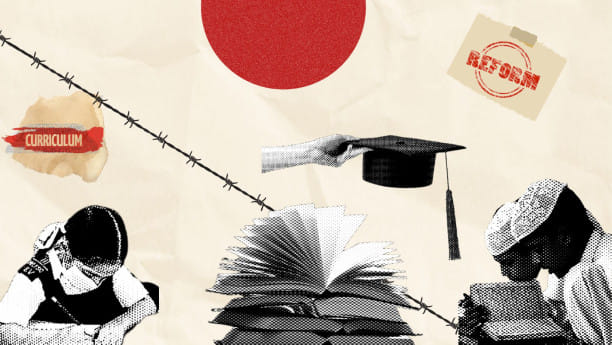Priorities and challenges for the new education adviser

Education Adviser CR Abrar, newly appointed on March 5, spoke of his dream of an education system that would allow students to see their future within Bangladesh. Presumably, the education system would enable young people to acquire skills and competencies to realise their own goals in life and contribute to the nation's development. What actions can the adviser himself take, and what can he persuade the interim government to consider in promoting this indisputable objective?
The interim government has waded into reform efforts in many difficult, complex, and sensitive spheres. So far, 15 commissions and task forces have been set up. Many have submitted their reports, and consultations on building a consensus have begun. Education has been left out so far, despite demands from educationists and concerned citizens for an education reform initiative.
In the education sphere, the Ministry of Primary and Mass Education (MoPME) appointed a nine-member "consultation committee" last October. After four months of intensive work that included consultations with stakeholder groups and extensive field visits, the committee, headed by this author, submitted its report. It was formally received by the chief adviser on February 10. A more detailed technical report is to be submitted shortly.
The primary and non-formal education committee attempted to weigh the expectations and demands of diverse stakeholders and provided what it considered realistic and implementable recommendations for early, medium-term, and longer-term actions. Media reports and stakeholder reactions indicate that the report has been perceived positively. Moreover, the deliberative process and well-argued recommendations have had a calming effect, as evidenced by the absence of stakeholder protests, demands, and ultimatums in the primary education sub-sector. The diverse stakeholder groups are now watching to what extent and how the government demonstrates a good-faith and sincere effort to act on the recommendations. They will look for signals about how the recommendations are reflected in the upcoming FY2025-26 budget and the Fifth Primary Education Development Program (PEDP5), now under preparation.
The primary and non-formal education sub-sector reform initiative is a positive but partial move that leaves major education sector concerns unaddressed. The committee report itself has pointed to the need for a comprehensive approach and holistic thinking about the education system, especially school education from pre-primary to pre-tertiary levels. This calls for political choices by the state on education reform beyond the remit of MoPME alone.
In December 2010, a national education policy was adopted by parliament, which is still in effect. However, no effort was made to implement it. Such an effort would have required assigning tasks and responsibilities for preparing an action plan, setting priorities and targets among and within education subsectors, mobilising and allocating resources, and monitoring progress. The 2010 policy itself recommended the formation of a permanent and statutory education commission to guide and oversee the implementation process. Political decision-makers chose not to pursue this course.
Meanwhile, ad hoc, fragmented, uncoordinated, and partial subsector actions were taken without an overall mission or holistic strategy for the nation's education system. The education services mirrored or reproduced the prevailing social fault lines and economic classes in society. As a result, we see the growth of English-medium private schools for the elite, madrasas of different types for the poor, and mainstream government schools for the majority of the population—the low-income, lower-middle, and middle-income families. Historically, there were very few English-medium schools and madrasas in pre-independent Bangladesh. The three-way division of schooling was patronised by military rulers until 1990. Ironically, elected governments since then have followed the same path, further entrenching this division, despite various education policy reports identifying it as a systemic problem.
The political power-holders in Bangladesh have not represented the interests of the masses. The unequal, poor-quality, and non-inclusive education system suited the interests of the ruling classes—the oligarchs. As Prof Rehman Sobhan has often pointed out, a quick online survey would show that nearly 100 percent of MPs and members of Gulshan or Dhaka Club send their children to English-medium schools. He might have added that a significant proportion of families below the poverty line send their children to one of various types of madrasas. He advises a serious probe into household schooling choices as both a possible cause and consequence of widening social disparities. Explaining the roots of disparities is necessary, but this can lead to remedial action only if decision-makers see the need and feel the obligation for such actions.
It is unrealistic to expect that the interim government, given its uncertain tenure and the larger political context in which it operates, will break away completely from the pattern of an unequal and non-inclusive education system that has emerged over the decades. A radical change in policy and decision-making mechanisms, as well as in the mindset of key actors, is unlikely in the present context. These factors contribute to poor learning outcomes and unequal life chances for the majority of children.
What the education adviser may aim for now is at least to move away from the fragmented and ad hoc decision-making approach—often dependent on individual ministry officials' preferences and the default mode of taking the path of least resistance, avoiding disruption, and postponing solutions, which often do not address the root of the problem and may even create greater problems in the future.
The experience with the consultation committee on primary and non-formal education highlights the value of a deliberative and dialogue-driven process, in which stakeholders have faith and trust. A consultative council consisting of academics and others with a reputation for being knowledgeable and fair-minded can serve as such a mechanism for the entire education sector. It would have to be somewhat different from a committee focused on a single sub-sector. The education sector encompasses major sub-sectors with distinct objectives, pedagogic approaches, beneficiaries, organisational arrangements, and state obligations. The challenges vary across primary and secondary education, vocational and technical skill development, higher general education, higher professional education, the parallel madrasa system, and non-formal lifelong learning. Policy responses and the scope of implementable measures by the state must be informed by insights into both the unique characteristics of each sub-sector and their interconnections. Therefore, a consultative council for the education sector should include sub-sector committees to ensure a holistic perspective is maintained.
The consultative council, among other functions, can guide the preparation of a medium-term (five-year) education sector plan and a longer-term (10-year) perspective plan. The government can also use it as a sounding board, seeking its advice for decision-making on critical issues. It should have an open-ended tenure and could eventually be replaced by a permanent national education commission under an elected government.
I propose that we begin rethinking our education system now, rather than deferring it to the post-election ruling party or parties. The past record of political parties of all stripes regarding education has not been stellar. Work done now, in an apolitical environment, to set the agenda, priorities, and strategies may help nudge political parties in the right direction. Appropriate policy-relevant research to inform policy deliberation should also be encouraged.
Dr Manzoor Ahmed is professor emeritus at BRAC University, chair of Bangladesh ECD Network (BEN) and adviser to Campaign for Popular Education (CAMPE).
Views expressed in this article are the author's own.
Follow The Daily Star Opinion on Facebook for the latest opinions, commentaries, and analyses by experts and professionals. To contribute your article or letter to The Daily Star Opinion, see our guidelines for submission.




 For all latest news, follow The Daily Star's Google News channel.
For all latest news, follow The Daily Star's Google News channel. 

Comments